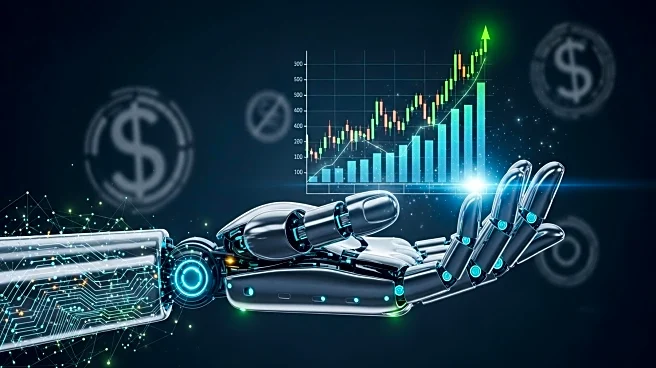What's Happening?
The U.S. stock market has continued to set records despite economic challenges such as a government shutdown, a weakening labor market, and persistent inflation. The S&P 500 and Nasdaq indexes have experienced over 30 record closes this year, driven largely by investments in artificial intelligence (AI) and the anticipation of lower interest rates. The 'Magnificent 7' tech stocks have significantly contributed to the S&P 500's gains, accounting for two-thirds of its 3.65% increase last month and 41% of its nearly 15% gain this year. However, the economic growth spurred by AI investments has not translated into substantial job creation, with 2025 on track to be one of the worst years for new payrolls. Concerns are rising about the sustainability of this growth, especially as Oracle's ability to finance chip purchases from Nvidia has been questioned, potentially affecting other companies benefiting from AI.
Why It's Important?
The current stock market performance highlights a growing economic divide, where wealthier households benefit from stock gains while lower- and middle-income families face economic challenges. The AI-driven market surge underscores the increasing influence of technology investments on economic indicators, yet it also raises concerns about the lack of job creation and the potential for a market correction. The Federal Reserve's potential interest rate cuts aim to support hiring, but inflation remains a concern. The situation reflects a 'K-shaped' economic recovery, where different segments of the economy experience divergent outcomes. The market's reliance on a narrow group of tech stocks suggests vulnerability to shifts in investor confidence or economic policy changes.
What's Next?
The economic landscape remains uncertain, with potential implications for future market performance. The Federal Reserve is expected to announce further interest rate cuts, which could influence stock market dynamics and economic growth. The ongoing government shutdown and tariff plans by President Trump add layers of complexity to the economic outlook. Analysts warn that any disruption in the current economic script could lead to a recession, highlighting the precarious balance the economy is currently maintaining. Stakeholders, including investors and policymakers, will need to navigate these uncertainties carefully to sustain economic stability.
Beyond the Headlines
The stock market's resilience amid economic challenges raises questions about the long-term implications of AI investments and the sustainability of current market trends. The concentration of market gains among a few tech companies suggests potential risks if these companies face financial difficulties or if investor sentiment shifts. The broader economic impact of AI, including its role in job creation and economic inequality, will likely continue to be a topic of debate among economists and policymakers. The situation underscores the need for a balanced approach to economic growth that considers both technological advancements and their societal impacts.









